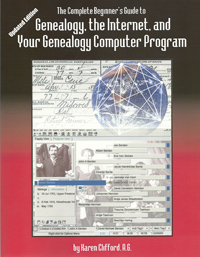|
CAPTURING YOUR EVIDENCE
As a family historian, you will be spending a great deal of time seeking out the truth about each life that you study. It would be a shame if your hard work were to be discounted in the future because you had not provided information about the sources you used.
This lesson demonstrates the importance of, and methods for, recording sources. The best way to enter sources is at the same time the vital information is being recorded. Particularly important are those sources that provided evidence that one individual was related to another. Your task as a researcher is to faithfully record not only the information you learn, but also the sources of that information.
The two are inextricably bound: information has little value without the source, and the source is irrelevant without the information.
 Chapter Four in The Complete Beginners Guide to Genealogy, the Internet, and Your Genealogy Computer Program gives five important reasons for documenting your information.
Can you recognize those that were listed from the eight listed
below? Chapter Four in The Complete Beginners Guide to Genealogy, the Internet, and Your Genealogy Computer Program gives five important reasons for documenting your information.
Can you recognize those that were listed from the eight listed
below?
- It helps you learn how to type better in your computer program.
- It saves time and helps you to avoid duplication of research.
- Your work is accepted as creditable.
- It makes your work look important.
- It really isn't necessary to document "all" your sources, just the ones you think people will want to know.
- Others can take off where you stopped and perhaps go further toward solving your problem.
- You are able to analyze information more readily.
- Documenting correctly at the start will mean little editing needed at the end.
|